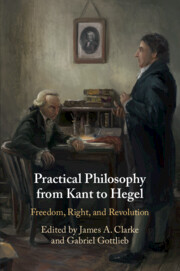Book contents
- Practical Philosophy from Kant to Hegel
- Practical Philosophy from Kant to Hegel
- Copyright page
- Contents
- Contributors
- Acknowledgments
- Abbreviations
- Introduction
- 1 The Original Empty Formalism Objection
- 2 Freedom and Ethical Necessity
- 3 Maimonides and Kant in the Ethical Thought of Salomon Maimon
- 4 Erhard on Right and Morality
- 5 Erhard on Revolutionary Action
- 6 Elise Reimarus on Freedom and Rebellion
- 7 Freedom and Duty
- 8 Fichte’s Ethical Holism
- 9 Jacobi on Revolution and Practical Nihilism
- 10 The Political Implications of Friedrich Schlegel’s Poetic, Republican Discourse
- 11 The Limits of State Action
- 12 Echoes of Revolution
- 13 Public Opinion and Ideology in Hegel’s Philosophy of Right
- Bibliography
- Index
Introduction
Published online by Cambridge University Press: 16 March 2021
- Practical Philosophy from Kant to Hegel
- Practical Philosophy from Kant to Hegel
- Copyright page
- Contents
- Contributors
- Acknowledgments
- Abbreviations
- Introduction
- 1 The Original Empty Formalism Objection
- 2 Freedom and Ethical Necessity
- 3 Maimonides and Kant in the Ethical Thought of Salomon Maimon
- 4 Erhard on Right and Morality
- 5 Erhard on Revolutionary Action
- 6 Elise Reimarus on Freedom and Rebellion
- 7 Freedom and Duty
- 8 Fichte’s Ethical Holism
- 9 Jacobi on Revolution and Practical Nihilism
- 10 The Political Implications of Friedrich Schlegel’s Poetic, Republican Discourse
- 11 The Limits of State Action
- 12 Echoes of Revolution
- 13 Public Opinion and Ideology in Hegel’s Philosophy of Right
- Bibliography
- Index
Summary
Traditional histories of German philosophy often present the development of German Idealism as a linear, teleological progression from Kant, through Fichte and Schelling, to Hegel. This approach originates in Hegel’s own history of philosophy, which portrays the history of German Idealism as a cumulative, dialectical progression that terminates – rather conveniently – in Hegel’s own absolute idealism. Over the past twenty years, there has been a growth of scholarship on the development of post-Kantian idealism, and a reappraisal of figures who were afforded only minor, supporting roles in the traditional narrative (figures such as K. L. Reinhold, S. Maimon, F. Schlegel, and Novalis). The effects of this revisionary scholarship have been salutary: it has resulted in a more nuanced picture of the development of German Idealism that challenges the standard Hegelian narrative; it has led to the recovery of important philosophical arguments and insights; it has made salient previously neglected continuities with earlier traditions (e.g., the Leibnizian-Wolffian and Spinozist traditions); and it has led to a deeper understanding of the philosophies of Fichte, Schelling, and Hegel by revealing their positions to be responses to hitherto unnoticed debates and questions.
- Type
- Chapter
- Information
- Practical Philosophy from Kant to HegelFreedom, Right, and Revolution, pp. 1 - 9Publisher: Cambridge University PressPrint publication year: 2021



